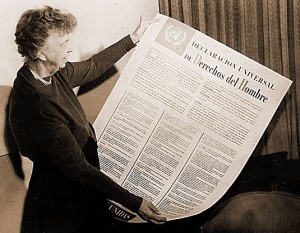The post-truth era bears severe risks for human rights practice, both in the analog and the digital sphere. However, it also reveals a very important fact: humans are much more affect-driven than we assumed; and this has severe consequences for human rights practice.
A large part in human rights work is trying to convince people who reject certain human rights to change their moral bases and to embrace these rights. When we interact with these people we image the other person as a rational human being who can be convinced by good arguments. However, the equation of “moral judgment” and “moral reasoning” is based on a fundamental misunderstanding of human nature. Human nature and the question which natural characteristic humans have in common is a topic that runs like a common thread through the history of humanity. From Aristotle to Kant, the dominant answer to this question was rationality. As Kant postulates, man is „the only rational creature on earth“ (Kant 1963 (originally 1784), p 13). To put it in Richard Rorty’s words: „Traditionally, the name of the shared human attribute that supposedly ‚grounds‘ morality is ‚rationality‘.“ (Rorty 1998, p 171)
The post-truth era brings to light what some scholars already preached for years: our values and moral judgments are mainly driven by intuition or affect and our social environment. The social psychologist Jonathan Haidt is one of the main advocates of this view. He developed a model called “social intuitionist model of moral reasoning” (Haidt 2001; Haidt 2013) which is based on two main ideas: First, Haidt clarifies that it is not moral reasoning but intuition which is causing moral judgments. Moral reasoning is only a post hoc construction. The basics of this idea can already be found in David Hume’s work, who states in the 18th century: “[r]eason is, and ought only to be the slave of the passion, and can never pretend to any other office than to serve and obey them.” (Hume s.a., 127) To illustrate this view Haidt is using the following metaphor:
“the mind is divided, like a rider on an elephant, and the rider’s job is to serve the elephant. The rider is our conscious reasoning – the stream of words and images of which we are fully aware. The elephant is the other 99 percent of mental processes – the ones that occur outside of awareness but that actually govern most of our behavior.“ (Haidt 2013, p XXI, emphasis in original)
Second, the moral judgments developed from intuition are not to be set in stone but can be changed by our social environment. Other people’s judgments and their reasoning can change our intuition and our core moral judgments. As Baruch de Spinoza already stated in the 17th century in Ethics IV (Spinoza 2002) humans are “social animals”. Referring again to the metaphor of the “rider and the elephant”, Haidt clarifies: “[…] the bottom line is that when we see or hear about the things other people do, the elephant begins to lean immediately.“ (Haidt 2013, p 83)
To sum up, humans have a social-intuitionist nature. They base their moral judgment mainly on intuition and social influence and not on reason – and this finding has severe consequences for the way we approach people in human rights work.
References:
Haidt, J 2001, ‚The emotional dog and its rational tail: A social intuitionist approach to moral judgment‘, Psychological Review, vol. 108, no. 4, pp. 814–834.
Haidt, J 2013, The righteous mind. Why good people are divided by politics and religion, Vintage Books, New York.
Hume, D s.a., A treatise of human nature. in two volumes. 2, Dent, London.
Rorty, R 1998, ‚Human Rights, Rationality, and Sentimentality‘ in Truth a

